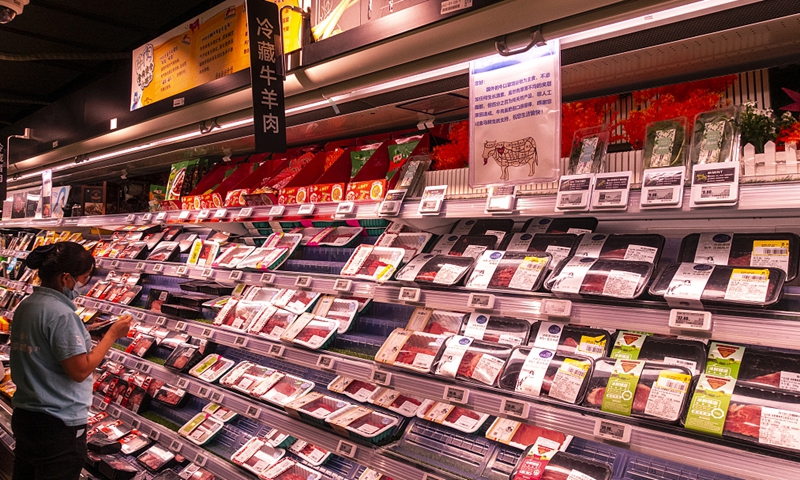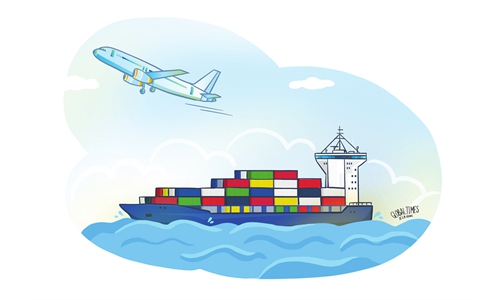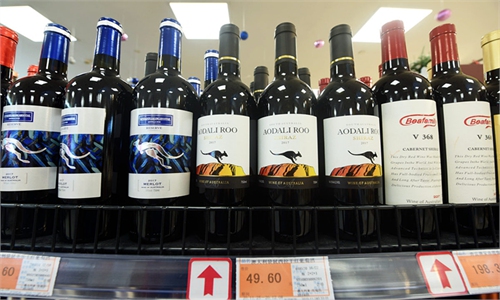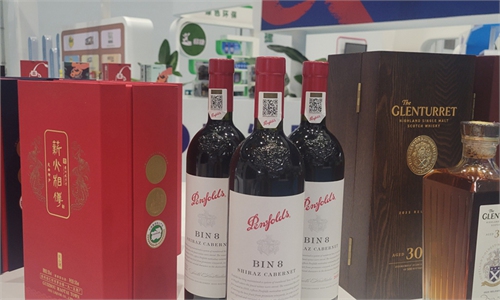Reported resumption of Australian beef exports to China 'shows result of pragmatic cooperation'

Imported beef is sold in a supermarket in Shanghai. Photo: VCG
The reported approval paving the way for the resumption of Australian beef exports to China is an encouraging sign, marking one more improvement in bilateral trade ties, and it is expected to contribute to bilateral trade growth, Chinese observers said on Wednesday.
A number of Australian media outlets reported on Thursday that five more major Australian beef exporters have been granted permits to resume exports to China, citing Australian Agriculture Minister Murray Watt.
Patrick Hutchinson, CEO of the Australian Meat Industry Council (AMIC), said in a statement sent to the Global Times on Thursday that the council welcomes confirmation through the China Import Food Enterprises Registration System of China's reinstatement of export approvals for five out of seven Australian meat export processors that were suspended in 2020 due to technical reasons.
Coming six months after three processors had their COVID-19 suspensions lifted, AMIC and the affected meat processors have continued working tirelessly to ensure that technical issues had been addressed, and the Australian and Chinese governments had all technical information and documentation required to reinstate access and recommence trade, read the statement.
Although there was no official confirmation from the Chinese side as of press time on Thursday, observers following China-Australia trade called the development an "encouraging" sign, adding that increased trade in agricultural commodities will be conducive to the development of bilateral ties.
The current Albanese government has adopted a more rational approach, as compared with the previous Morrison government, in handling trade disputes, and it has chosen not to politicize, instrumentalize or weaponize business disputes. A series of settlements on the issues of barley, wine and now, as reported, beef, is a result of such a pragmatic approach, Chen Hong, president of the Chinese Association of Australian Studies and director of the Australian Studies Centre at East China Normal University, told the Global Times on Thursday.
"Trade and economic ties remain a stabilizer and booster for bilateral ties, and the mutually beneficial nature of bilateral trade makes it something that deserves efforts from both governments to nurture, rather than to politicize," Chen said.
Since taking office in 2022, the Albanese government has remedied its predecessor's irrational anti-China policies, prompting a positive response from Beijing. Hence, bilateral ties have bottomed out and stabilized.
Exports of Australian coal, barley, and cotton to China gained momentum last year, leading to a marked growth in bilateral trade.
In March, China's Ministry of Commerce announced a decision to cancel anti-dumping and anti-subsidy tariffs levied on Australian wine. Australian wines appeared at the China International Consumer Products Expo in Haikou, South China's Hainan Province, in April.
The improvement of bilateral ties with China is in the long-term interest of Australia, Chen said, warning that the country should not become a tool in the anti-China campaign of the US.
In 2023, China remained the No.1 destination for Australian red meat exports by volume, importing 206,193 tons of beef and 165,245 tons of lamb and mutton, according to industry portal Meat & Livestock Australia.




